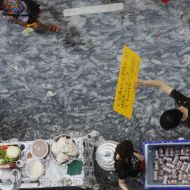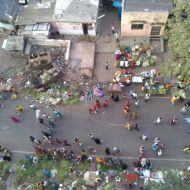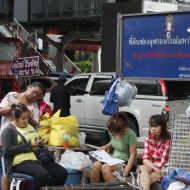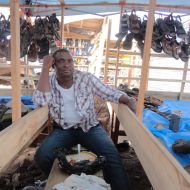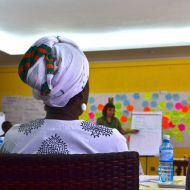Breaking Rules and Flouting Bans at Thailand’s Annual Nationwide Water Fight
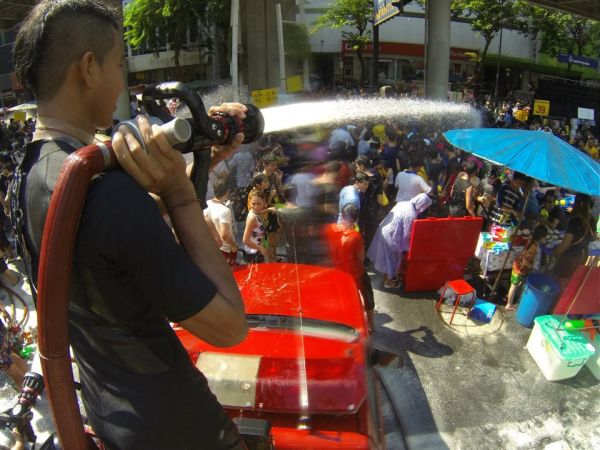
Pop, an emergency rescue volunteer, hosing down revelers in Silom. He is here with the Ruam Kratanyu informal ambulance team to provide first-aid, but mainly to enjoy the fun. Photo credit: Witchaya Pruecksamars
“Yow!”
The shout was directed at me from behind. I wheeled around to find a giant gun pointed right at my head. In the split second before the gunman pulled the trigger – with a smile – I could see, almost in slow motion, a stream of water jet from the tip of his firearm, a mere five meters away. With the reflexes of a ninja, I evaded the headshot narrowly and managed to shield my camera from the liquid.
The assassin, in this case, was one amongst hundreds of vendors who emerge at this time of year to sell fancy plastic water guns to the thousands who come out for Thailand’s annual nationwide water fight. He didn’t really want to get me wet (hence the friendly warning shot), he was simply making sure that I was properly soaked in the festive spirit of Songkran, which I appreciated.
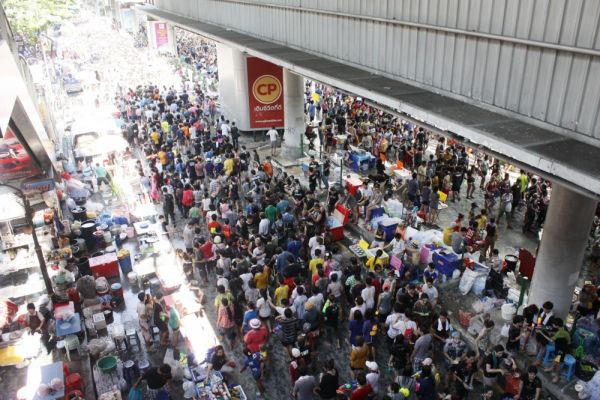
Songkran crowds in Silom as seen from the Skytrain platform. Photo credit: Witchaya Pruecksamars
Somewhat similar to the Holi festival in India, Songkran is a yearly riot of squirt-gun combat, in which a normally very hot nation is summarily hosed down. I was there at Silom, the Bangkok neighborhood where the largest and wildest crowd always gathers, to investigate the informal scene without getting my camera wet. (I was also carrying some newspapers I’d bought earlier).
On the Skytrain platform, I came across Boom, a university student, who was selling colorful zip-lock plastic bags. I could tell that he was uneasy with me interviewing and taking pictures of him, because not so far away a security guard was pretending not to stare at us. I could feel a strange tension building in the air. So I let the youngster be, not wanting to get him into any trouble.
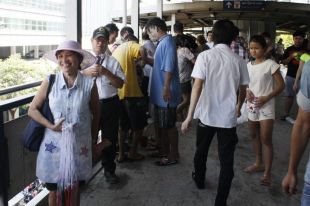
Pam, a masseuse by profession, selling zip-lock bags on the Skytrain platform. Our skeptical security guard stands behind her. Photo credit: Witchaya Pruecksamars
A few steps further, I met a small lady with a nice smile standing out on the crowded and drenched platform. Her name was Pam, and she was selling the same colorful zip-lock plastic bags that Boom was. Pam makes 800 to 900 baht ($28 to $31 USD) per day during Songkran, roughly double what she makes in her main profession as a masseuse in the nearby beach city of Pattaya. Every year she comes to Bangkok during this period to sell hats and bags. She didn’t seem to mind me asking her questions, but then she pointed to the security guard behind me. (He’d followed me!) I guess the guard was feeling insecure about me and my camera, afraid I might report the informal vending to the media, leading to the exceedingly remote possibility that his boss would scold him.
I further discovered that while most people were playing hard, there were many others who were working hard. Just like Boom and Pam, informal workers try to make the best of the festival by selling the essentials: Warm snacks on sticks, fresh-out-of-the-pan fried eggs with rice, soft drinks, water and beer, as well as Angry Birds and Doraemon water guns and zip-lock bags to keep wallets and phones dry.
Songkran-specific services were also being provided. Empty water guns could be filled for 5 baht (or 10 baht for ice-cold water). And people were paying to park their motorcycles on the sidewalks around the area of Silom. This parking business usually only happened at night — I passed through the area at 2 o’clock in the afternoon and there were no motorcycles on the sidewalk, but by ten that night, I walked past the same area again and there must have been a hundred of them parked where people normally walk, accompanied by informal workers holding up signs that said “valet parking.”
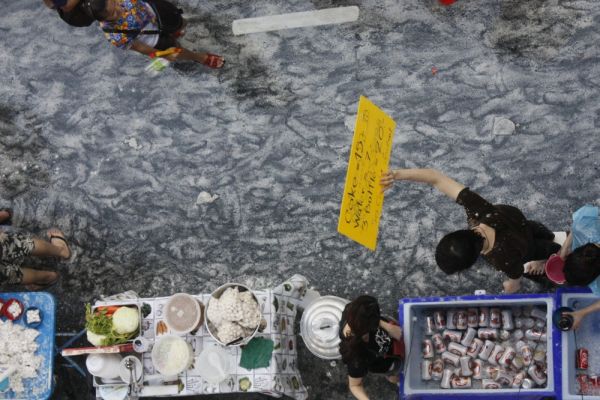
Informal vendors selling water guns and zip-lock bags are at the heart of the Songkran festival. Photo credit: Witchaya Pruecksamars
This is definitely illegal, but no one seemed to mind. For one thing, Thais tend to brush these things off, saying “_mai pen rai_ (ไม่เป็นไร)” or “don’t worry” as an easy excuse for everything. In addition, the authority isn’t as strict at night – for they too are humans who need to sleep — and there are many people who aren’t able to participate in Songkran until after nightfall. These are the formally employed who have just finished their shifts – they work as catering staff in the restaurants and in food courts in nearby hotels and shopping malls. They, too, have a pent-up desire to celebrate.
I must confess that joy welled up inside me as I discovered that some of the formal regulations and bans that had been announced prior to the festival were totally ignored, such as the ban on street vending in Silom, a preposterous booze ban and another cheap ban on spraying water from the beds of pickup trucks. It is such informal practices that make festivals like Songkran possible and fun – indeed, the very spirit of Songkran celebrates the riotous chaos of Bangkok’s streets. (Don’t ruin my Songkran!)
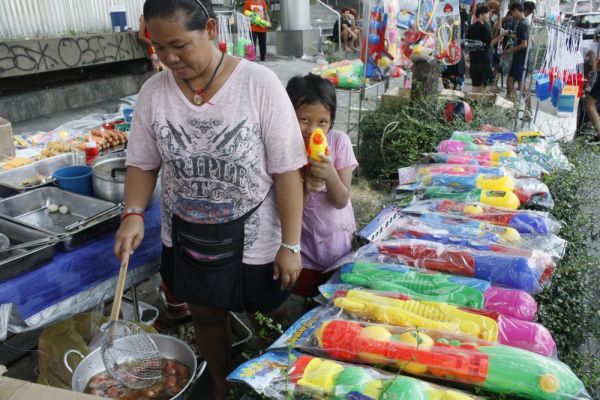
Like many other vendors, this food vendor uses the green hedge to display her water guns. “If they’re kept well, then they can be stored for a long time,” she says while frying up sausages. Any guns not sold this year, she’ll keep for future festivals. Photo credit: Witchaya Pruecksamars
I’m not sure whether this was a triumph of the city’s entrepreneurial and fun-loving spirit, or merely a result of selective enforcement on the part of the authority. My cousin in the northern province of Lumpoon told me that he just experienced the quietest Songkran ever; people apparently didn’t celebrate because they feared the authority’s bans. I find it ironic that the bans announced for Bangkok were more strictly enforced elsewhere, all while being totally ignored by Bangkokians. Perhaps the authority is willing to make a few exceptions — especially for places where foreign tourists are romping and splashing about.
As for me, I managed not to get wet in the rollicking fun. Next year I’ll come to Silom again — without the camera.

